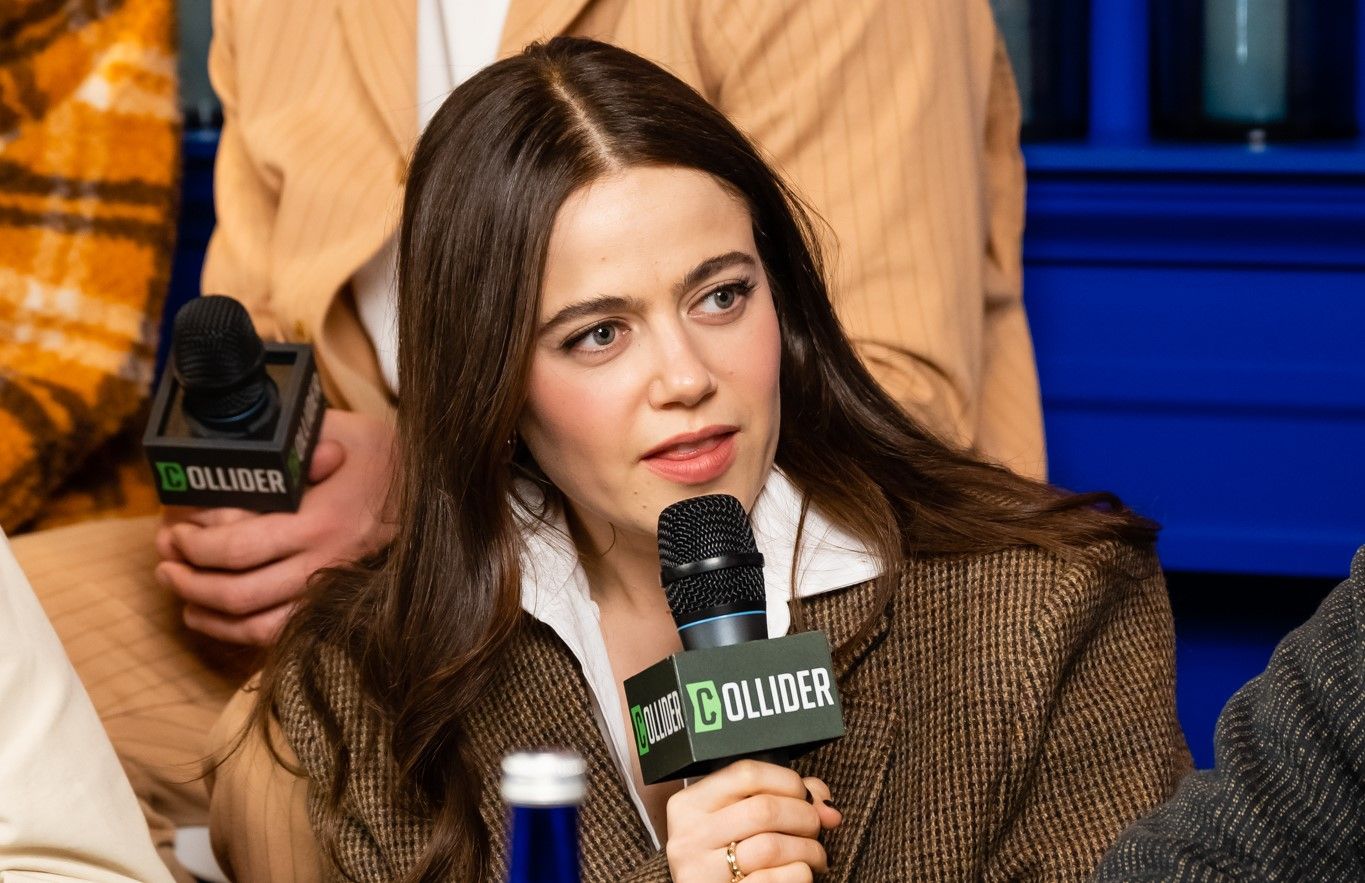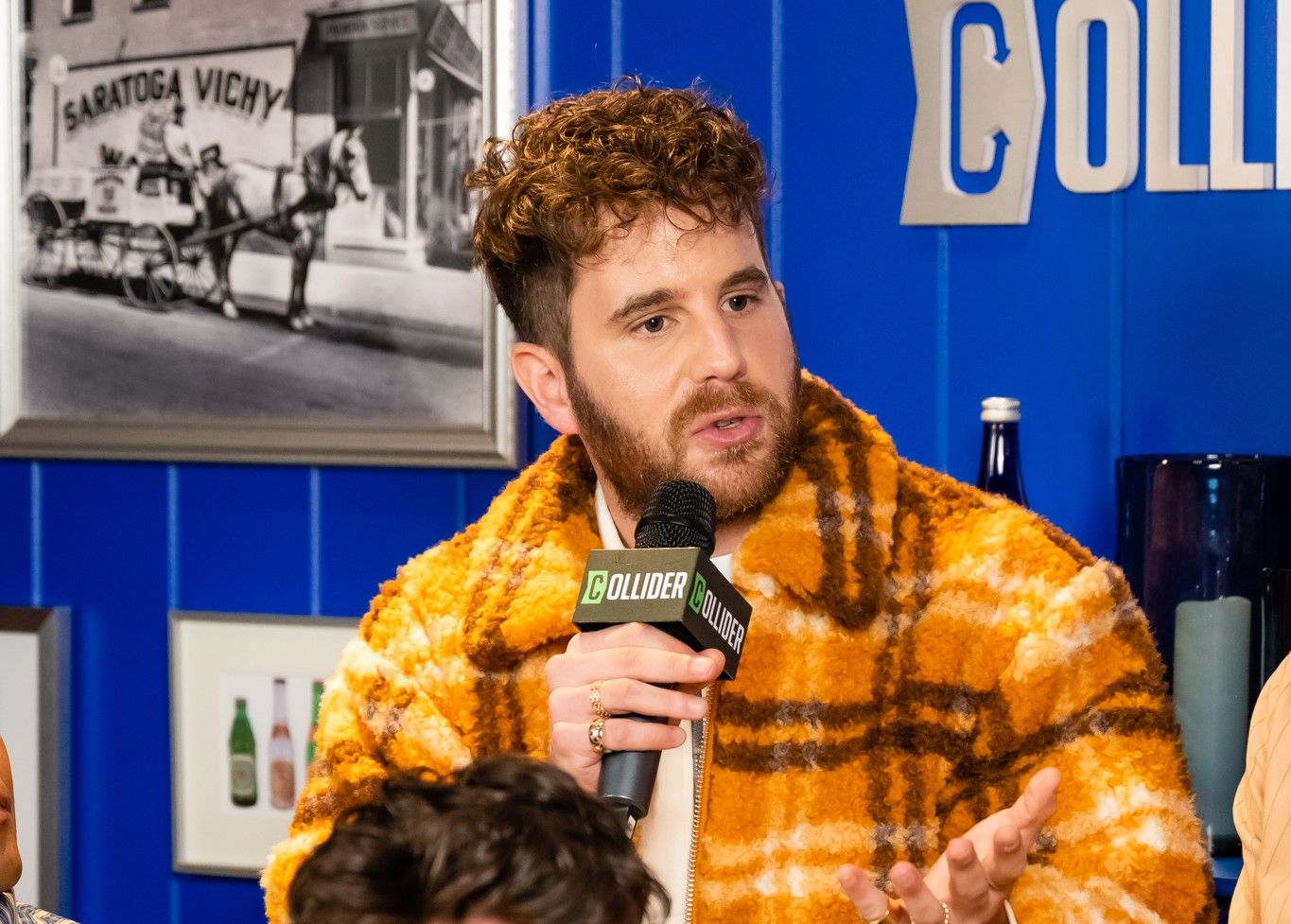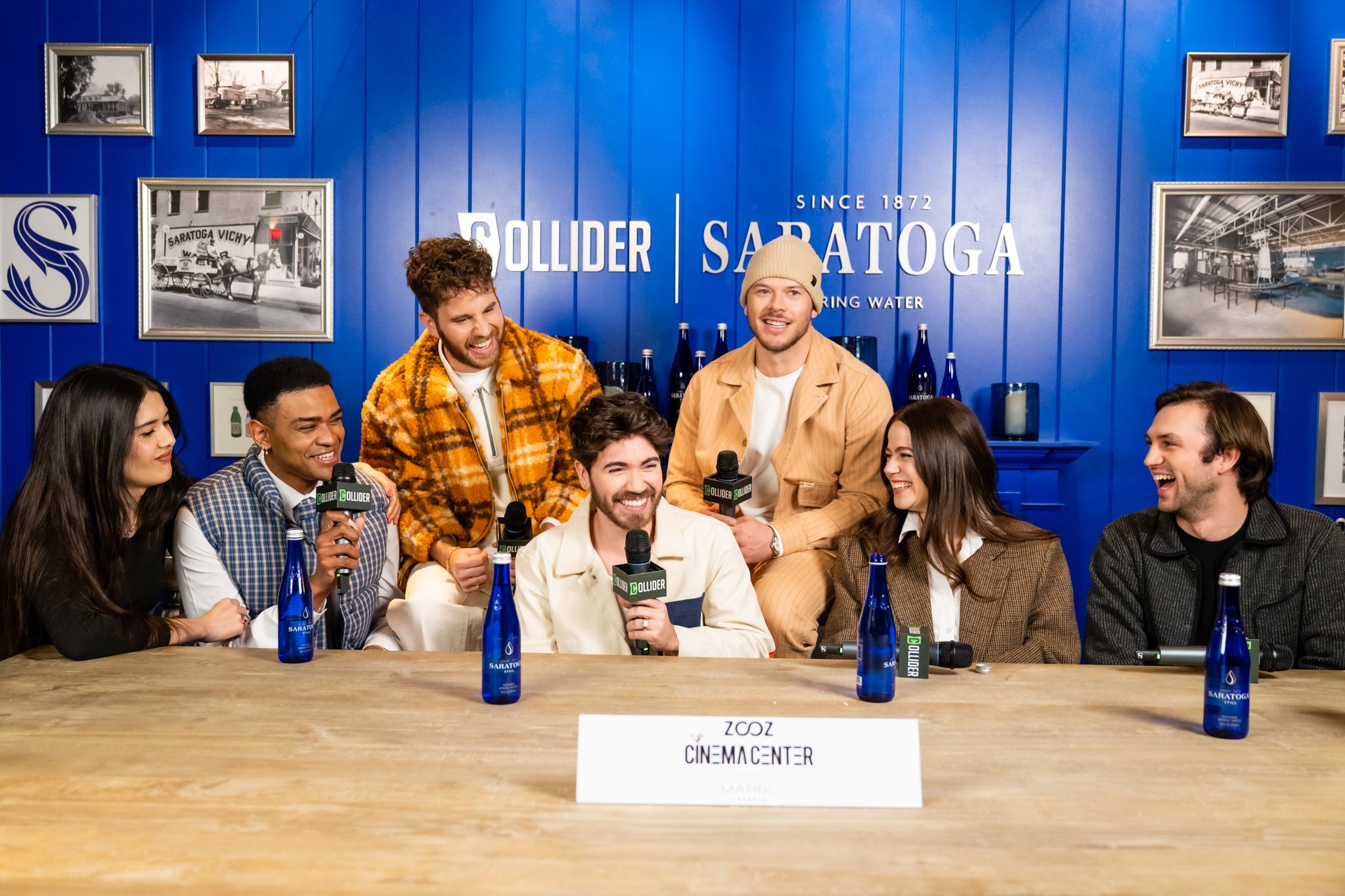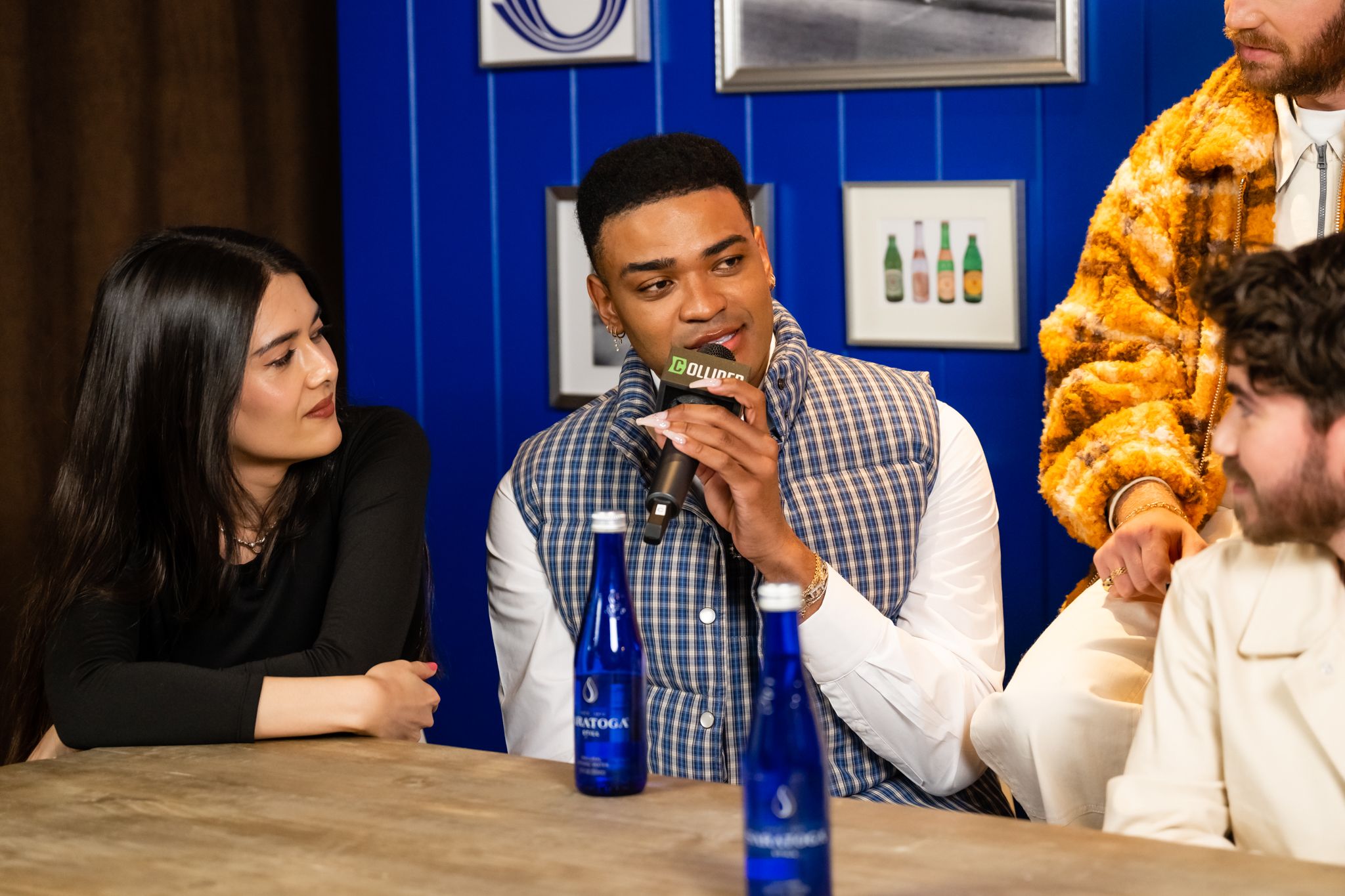“You can’t really make fun of something without it coming off as mean unless, deep down, you truly love it, and I think that really comes across.” That’s how Jimmy Tatro described Theater Camp during our Sundance 2023 interview, and that description is spot-on.
Inspired by the short film created by Molly Gordon, Ben Platt, Noah Galvin, and Nick Lieberman, the feature reunited that foursome and added a number of new creators to the team including Tatro, Patti Harrison, and Owen Thiele. Gordon, Platt, Galvin, and Thiele all play teachers at an Upstate New York theater camp. When the founder of that camp unexpectedly falls into a coma, her son (Tatro) who knows little to nothing about that world must step in to keep things up and running. Trouble is, the camp is in financial ruin and corporate vultures like Harrison’s character are eager to swoop and capitalize on the camp’s struggles.
The filmmakers certainly go all out poking fun at a slew of theater camp and industry cliches, but they find great success in delivering those laughs with respect, reverence, and passion for the world they’re playing in. In fact, not only will Theater Camp likely appeal to those with similar experiences, but the film’s ability to welcome outsiders in and share in the magic of creating in such a safe space could be the key to moving and inspiring a wide audience.
In celebration of Theater Camp’s Sundance Film Festival premiere, Gordon, Platt, Galvin, Lieberman, Thiele, Tatro, and Harrison all visited the Drumpe Studio Presented by Saratoga Spring Water to talk about their experience making a movie about a place they love with people they love. You can watch the full conversation in the video at the top of this article or read the transcript below.
Also, be sure to keep an eye out for the film. Searchlight Pictures snagged the worldwide distribution rights to Theater Camp at the festival!
Most of our audience will not know what your movie is just yet, so can you give a brief synopsis of Theater Camp?
NICK LIEBERMAN: Theater Camp is about a rundown Upstate New York theater camp that falls into disarray when their beloved founder falls into a coma and the reins of the camp fall to her bro son, Troy, and he has to find his way in this very theatrical and intense community. But it’s also just a portrait of the camp and what it means to have a place where outcasts can come together through their shared passion.
Molly and Nick, this is a feature directorial debut for you here. It’s not easy to get your first feature off the ground, so can you pinpoint a misconception about what it takes to make a first feature as a director happen, but then also, what is a piece of advice that you got that actually proved useful?
MOLLY GORDON: I think a big piece of advice that was given to us and that kept happening was that mistakes are gonna happen all the time, everything’s gonna fall apart, you’re gonna lose your financing. You’re just gonna have to reinvent, reinvent, reinvent and every obstacle is an opportunity for a new idea. A movie is made up of your compromises and your mistakes, and they end up being beautiful, and to not freak out about those things. And I feel like once we got Zen with that, we really found our groove.
Molly, do you remember the specific film or experience you had that first sparked the itch to direct? Maybe something that made you think, ‘You know what? I could do that, too!’
GORDON: When my parents introduced me to Robert Altman and John Cassavetes movies, I was just so floored with the freedom that they both allowed their actors to have, and I was like, ‘Oh my god, I want to create a space where people can play in that way.’ And Nora Ephron. So many people! But also, I got the itch from just being friends with all these amazing people and being an actor and working off of wonderful other actors and wanting to give them opportunities where they could actually get to own their roles because as an actor, you don’t always have much control. And so I really wanted to have this sandbox where they could come and do what they want a little bit, with clear boundaries, too.
With that idea in mind, can you pinpoint a time on this set when you had the freedom to do something with your character or the production overall that, even with all your experience, you’ve never had before?
BEN PLATT: Molly and I, we get to do a lot of our stuff together in the film and we spent a lot of time, the four of us, writing a very detailed scriptment for the movie. It was largely written, but a lot of room for improvisation. We had a moment where there was a schedule change and a whole snafu and somebody wasn’t available and there are hours with children, so certain children weren’t available, and basically we ended up with this slot of time to utilize that we didn’t know we were gonna have, and so Molly and I got to jump in and improvise the scene, part of which has ended up in the film, where we’re working on writing a musical together that gets written by our characters in the movie. It was very frightening to kind of jump in because it’s one of the first things that Molly and I got to do together, but it, I think, really set the tone for the set just feeling like a space where there’s no wrong answers and that we were gonna use every moment we could and really lean into the flexibility as a strength, and I think that it’s one of my favorite moments in the movie.
Can anyone else think about a time on set when you were all standing there and maybe thinking, ‘I don’t know how this is gonna work,’ ‘We’re not gonna make our day,’ or something of the sorts, and you found a creative way to pivot, found some unexpected magic and a scene is better off for it?
NOAH GALVIN: I’d say that was every day, every moment. [Laughs] But it was. It was like every single day was another problem to creatively solve, and I think it was nice that it felt like such a collaboration. It felt like all hands on deck and what a group of brilliant minds to be those hands.
When you all first came up with the idea to turn the short film into a feature, what would you say is the biggest difference between how you envisioned the feature then and what you have now?
GALVIN: Purely content-wise, if you look at our first draft, there were probably like seven additional characters that were there that got cut. We had a whole other framing device for the film for a sort of window in. But that’s the beauty of it, you know? It was this five-year process of us as a foursome just going over to Ben’s house and eating salad …
GORDON: And only salad.
GALVIN: [Laughs] And only salad. But just really trying to find it together, and I think we managed to put something together that we all feel really proud of.
Patti, Owen, and Jimmy, I read in the press notes that everyone who worked on the short has a shared creative language and trust. For the three of you being newer and stepping into that world, is there anything about that shared history between your collaborators that enhanced your own experience?
PATTI HARRISON: Yeah. Just the lack of knowing in anything what it’s gonna be, what the experience is gonna be like. But, there was this strange calm. It’s one of the only things I’ve worked on where I was lucky enough to know everyone who was kind of steering, and in such a positive way that they’re all so funny and nice. There was a comfort in knowing that they were so excited about how fun it was gonna be. Their enthusiasm behind it was very reassuring. Because there was the improv element of it, that left a lot of questions going into it. I can only speak for myself, but I was like there’s no way it’s, at the very least, not gonna be fun. I am cut from the film. [Laughter] But I have an amazing publicist, so I’m here at the table.
OWEN THIELE: I’ve known Molly since I was two and she’s been a sister to me ever since, and so just becoming a part of her world with her best friends and integrating into her life and all of them then becoming my best friends has just been a magical experience. And so, yes, the improv was scary. It was like, ‘What am I gonna say? I actually don’t know,’ but it was amazing. It was such a collaborative experience and these people are so funny, so it was magical. It was great.
HARRISON: And I just want to say I’ve known Molly since I was 30, yeah.
JIMMY TATRO: I think the collaborative nature of the project was just very contagious. And being the new guy, I didn’t know any of them before this, but stepping into what was clearly a group of very close friends making something together, you never really know how that’s gonna go. And as someone who makes my own stuff and works with friends, it just made me so happy, genuinely so happy for them to watch everything work and come together, and they made such a great team. I barely knew them before this and I just was proud. I just felt proud of them. I’m just so happy for you guys to be able to make such a cool thing with your best friends and just [to] be a part of it was awesome.
Molly, it’s really special and unusual to be able to make connections at such a young age and maintain them. What’s the secret sauce? There are so many people out there who go to film school, who go to theater camp and do these programs and then say goodbye to the people they meet and there’s no guarantee that you’ll see even a single one of them later on in life.
GORDON: I’ve paid all of them to still be my friends. [Laughs] I don’t know what it is. I think it’s them being very special. I met Patti a couple of years ago and I was like, ‘Oh my god, we’re made of the same kind.’ I just feel like I keep getting led to the right people and collecting them along the way. I don’t know what it is, but what I’m excited about with this movie is that it feels like it’s all of our shared humor and we all just did — like when Noah makes me laugh, that’s just in the movie, and so it’s fun to have this piece that’s like, ‘Oh, this is that humor.’ I think everybody’s humor is in this movie and it’s a combination of that.
I know for some jumping into a film that has a significant amount of improv can be very intimidating. What is one tip or trick or tool you would give to another actor out there who’s scared to try improv for the first time?
THIELE: I would say, say the most inappropriate, horrible thing you can first and then let the directors be like, ‘That was crazy. Let’s dial it back.’ That’s how I started.
HARRISON: Yeah, just go as hard as you can right out of the gate. I think improv is a good tool, a good muscle to work even if you don’t feel good at it. I think if you’re acting, it’s a good thing to pursue for at least a little bit until you humiliate yourself, and then you should quit and then go into underwater welding, which is what I’m doing right now.
TATRO: I think it’s helpful after you do a couple takes of something, you can kind of start to feel the moments where you want to go off a little bit and you want to explore those moments. I like doing a couple takes first where you’re just kind of getting into the right flow and then you just get to really explore those moments that you could both feel wanted to happen and then just kind of let them.
PLATT: I think as writers, that the four of us, we’ve experienced improv from both directions and I think we really wanted to create a situation where no matter where you were coming into the project from in terms of your own comfortability or experience with improv, you felt protected and like you were in the right space to really go for it. And so I think we tried, in terms of the structure of how we would write things, to always have a very clear place to begin and if it was a particularly story-heavy moment or sequence or scene [to] have a written scene to begin with and just always have a landing pad, which on occasion would make it into the film, but often was just a beautiful takeoff point so that people felt like the pressure wasn’t on coming in with all of this content ready. It was just knowing exactly what your parameters are and feeling, even in the midst of free flying, which is what improv is, that you’re not entirely without a parachute of some kind.
HARRISON: It was great, I will say, because I was so nervous about where to take the character and what information I can add because you don’t know what other actors are gonna improvise later on in the movie or whatever, but it was so guided. I think Nick and Molly, it was like they were so present and being like, ‘More of that.’ If you were hitting something, you knew instantly if you were doing something right, which felt really great.
I wanted to go back to what you were saying about this movie being filled with things that you all find funny. What is it like working with material like that, but knowing that it’s accessible to the widest possible audience?
LIEBERMAN: Because we knew we were making an improvised movie, we definitely wanted to have the discipline of having a really clear structure. Being on the rails, we wanted characters that were not just from this world of theater, and so I think the idea of just trying to tell an authentically heartfelt story in that world makes it more universal, even if we are throwing in a couple of Chita Rivera references.
GORDON: I think Ben got this advice that sometimes the most niche-specific things can be the most universal.
PLATT: And I think, particular to this movie, we’re writing what’s at the very core of our passion. In terms of writing what you know, we kind of really took that to heart and it’s what brought us together in the first place, the four of us, in different ways. Molly and I started doing theater together when we were children, and Nick and I in high school, and with Molly and Noah in our late teens and early 20s. I think that that’s really palpable that shared passion. So even if you’re not a theater person per se, I feel like you can feel the love that we have for that and I think that anybody can connect that to whatever it is that centers them in their community, and hopefully that’s what makes it a very accessible heartfelt story.
In the short, I know you poke fun at certain theater camp and industry cliches. I’m assuming the same thing is true of the feature. What’s an example of something you all experienced in this industry or in theater camp or wherever else you studied that you were especially excited to skewer in this movie, and maybe it was cathartic for you?
LIEBERMAN: I definitely think the way in which theater teachers will introduce material that is far too mature for the children that they’re educating is so funny, especially with the earnestness with which they do that.
GALVIN: I think just generally watching people who take themselves a little too seriously is funny, you know? And I think the theater, the universe of theater, is filled with people who take themselves very, very seriously and it’s something we wanted to honor, but also make fun of a little bit.
TATRO: I don’t think this movie would have worked if it wasn’t made by four people that genuinely love and come from theater. You can’t really make fun of something without it coming off as mean unless deep down you truly love it, and I think that really comes across.
Special thanks to our 2023 partners at Sundance including presenting partner Saratoga Spring Water and supporting partners Marbl Toronto, EMFACE, Sommsation, Hendrick’s Gin, Stella Artois, mou, and the all-electric vehicle, Fisker Ocean.




